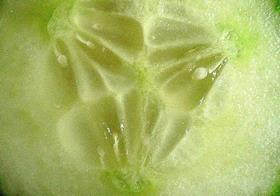
The results of laboratory tests carried out in Germany have apparently shown that Spanish cucumbers were not the source of the E.coli bacterium widely believed to be behind a recent major outbreak of haemolytic-uraemic syndrome (HUS).
The HUS outbreak has now killed a total of 15 people in Germany as well as one in Sweden, with hundreds more affected by the disease.
The pathogen discovered on two of the three Spanish cucumbers seized in Hamburg has apparently not caused the disease, reported Hamburg health minister Cornelia Pruefer-Storcks on Tuesday, 31 May.
'The source of the inspection remains unidentified,' Pruefer-Storcks said, warning the general public to avoid eating lettuce, cucumbers and tomatoes until the cause of the outbreak had been identified.
On the two cucumbers tested so far, the E.coli germ is now understood to be a different, less virulent strain to the enterohaemorrhagic Escherichia coli (EHEC) serotype 0104, also known as HUSEC041, identified as the cause of the deaths in northern Germany.



